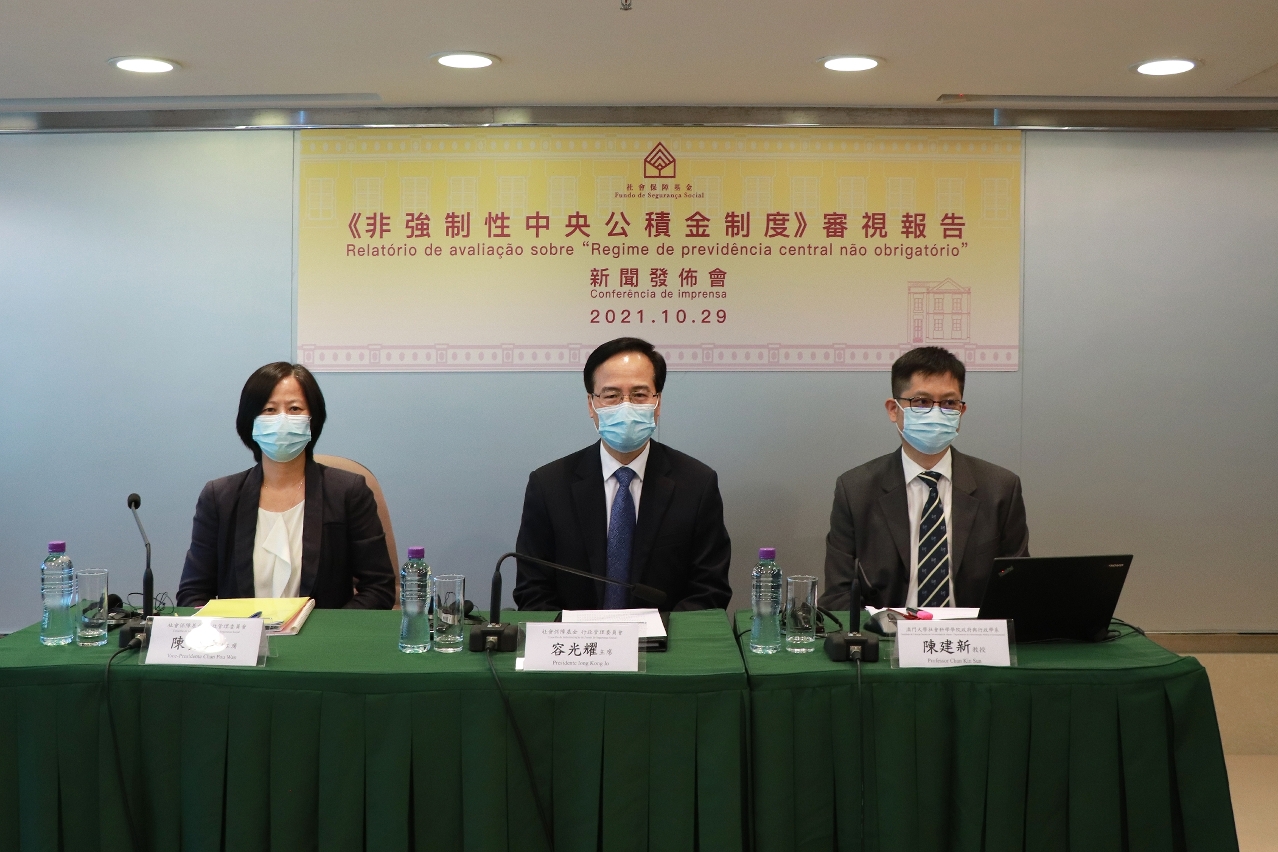 The "Non-Mandatory Central Provident Fund System" Review Report was announced today (29th Oct)
The "Non-Mandatory Central Provident Fund System" Review Report was announced today (29th Oct)
The "Non-Mandatory Central Provident Fund System" Review Report was announced today (29th Oct). The report indicates that certain results have been achieved in the three years since the implementation of the System, and conditions have already been met to move towards its mandatory implementation. However, the emergence of COVID-19 has had an impact on Macao’s economy. It is recommended that the SAR government set 2021 to 2023 as the three-year observation period, and depending on the economic recovery, set up two plans with a five-year and a seven-year preparation period, and implement the Mandatory Central Provident Fund System in 2026 or 2028.
The Non-Mandatory Central Provident Fund was implemented in 2018. In accordance with the Law No. 7/2017, the Social Security Fund (abbreviated to FSS in Macao) has completed the report on reviewing the implementation of the Law within 180 days after the Law has entered into force for three years, and details of the report were announced today (29th Oct). The University of Macau’s research team was commissioned to compile the report by summarizing the implementation data relating to the Non-Mandatory Central Provident Fund and the interview opinions of stakeholders, analysing Macao’s economic situation, the affordability of employers and the residents’ acceptance of retirement savings, in particular, to examine the necessary conditons for the mandatory implementation of the Central Provident Fund, as well as the impact of relevant measure on society and the economy. A feasibility plan for advancing the Mandatory Central Provident Fund and its implementation timetable were also put forward.
The review report points out that under the allocation system of Non-Mandatory Central Provident Fund, the government has cumulatively appropriated more than 28.6 billion patacas from 2010 to the end of 2020. An account owner can be allocated funds and income, up to a total of 86,910 patacas, which lays the foundation for the construction of the System. In the three years since the implementation of the contributory system, the participation in the System, the size of pension funds and the return on investment have all continued to grow, indicating that the System has been operating smoothly and certain results have been achieved. As of September this year, 264 employers have participated in the System and about 24,000 employees have participated in the joint provident fund scheme, and about 75,000 residents have set up individual provident fund schemes. These figures reflect that the residents are concerned about their retirement protection and they are gradually becoming aware of the importance of early planning and accumulating retirement reserves.
The research team conducted 20 in-depth interviews with different stakeholders. The vast majority of the interviewees agreed with the current arrangements of the System and held a positive attitude towards the mandatory implementation of the Central Provident Fund.
The report also points out that if Macao’s economy could take advantage of the good momentum of 2019, it would already have the conditions for mandatory implementation. However, the emergence of COVID-19 and its recurrent outbreaks around the world have major impact on Macao’s economy. Therefore, detailed consideration should be given to advancing the process of Mandatory Central Provident Fund. With reference to the forecast of International Monetary Fund (IMF), the real GDP of Macao in 2025 can rougly return to the level of 2019. Therefore, it is recommended to set 2021 to 2023 as the observation period, and subject to economic recovery, set up two plans - a five-year and a seven-year preparation period - i.e. implement the Mandatory Central Provident Fund as early as 2026 or 2028.
In terms of implementation details, including the vesting of benefits, the interface with private pension funds, and the upper and lower limits for the calculation base of contributions, it is suggested that a smooth transition to be made according to the current standards of the System, in order to avoid any uncertain factors.
The FSS will continue to promote the participation of employers, employees and individuals in the Non-Mandatory Central Provident Fund System, and it will continue to observe the overall economic situation and the people’s livelihood, and strive to promote the implementation of the Mandatory Central Provident Fund.
The full text and summary version of the "Non-Mandatory Central Provident Fund System" Review Report can be downloaded and viewed on the FSS’s website at www.fss.gov.mo. Residents may also call 2853 2850 during office hours for enquiries.


